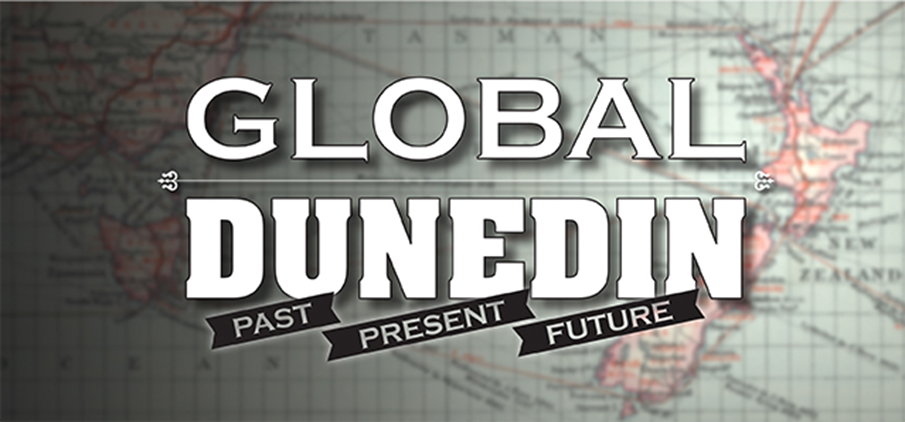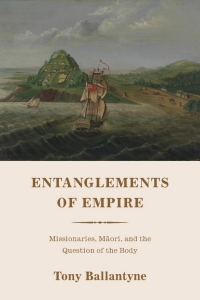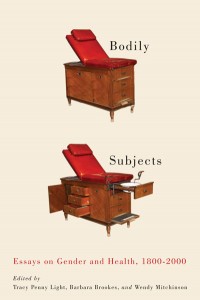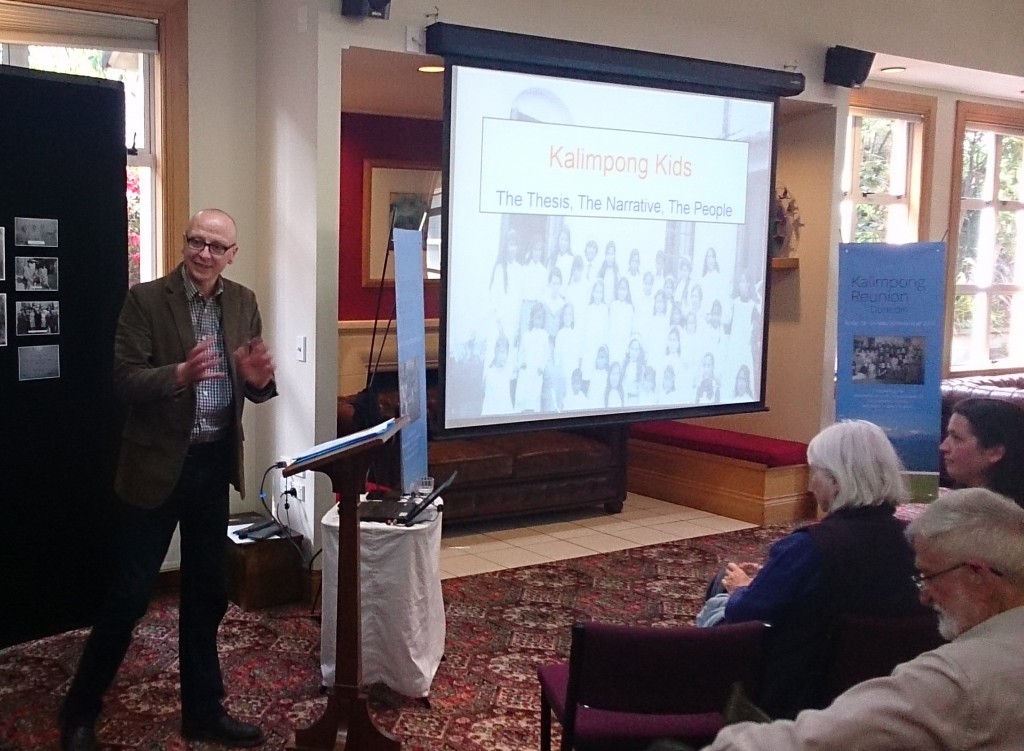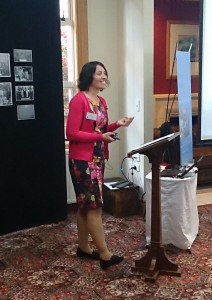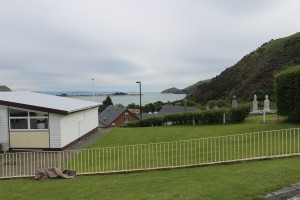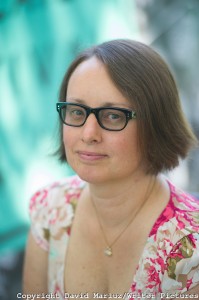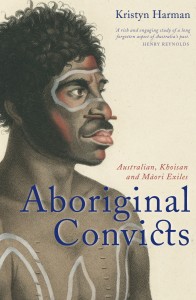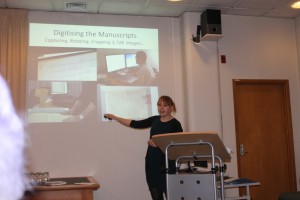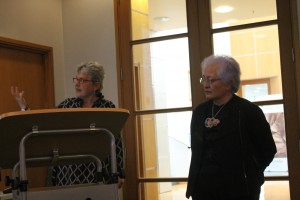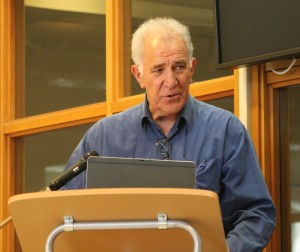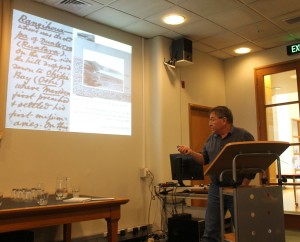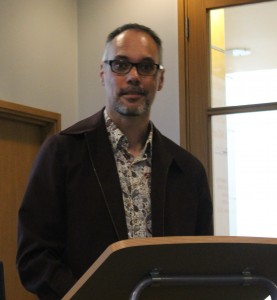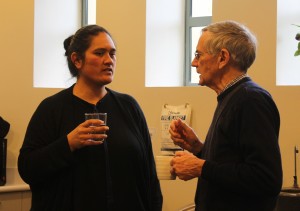Centre News: Research and Publications
Here’s a brief round up of what some of the Centre members have been up to over the past few months.
Hugh Morrison has been investigating New Zealand and Scottish Presbyterian missionary children’s experiences, including interviewing 21 people in New Zealand and Scotland over the last year. He gave a research seminar at the Scottish Centre for Diaspora Studies at the University of Edinburgh in January, called ‘Sand Through the Fingers: Tracing Notions of Scottish Cultural Identity in the Narratives of New Zealand Presbyterian Missionary Families, 1890-1940’. He’s got a few publications in the works, including one emerging from a workshop in Germany (July 2014) on Indigenous teachers in mission school contexts in Bolivia, and had a book review published in Social Sciences and Missions (2015). He reviewed Timothy Yates (2013), The Conversion of the Māori: Years of Religious and Social Change, 1814-1842. In late August Hugh is convening a symposium on children and young people in colonial contexts, which is sponsored by the Centre.
Tom Brooking has been busy over the past six months. He’s had an article on Seddon and the Pacific published in the Journal of New Zealand and Pacific Studies (2014) and book reviews published in Agricultural History (2014) and New Zealand Books. He has managed a third launch (after Dunedin and Hokitika) of King of God’s Own in Parliament sponsored by the Attorney General Chris Finlayson with the former Chief Historian and editor of Te Ara, Jock Phillips, giving the book his blessing. A fourth launch will take place at Powell’s Bookshop in Portland, Oregon during the New Zealand and Australian Studies section of the Western Social Science Association Annual Conference after Easter. His paper at this conference is on his next project on ‘The Making of Rural New Zealand’, entitled ‘Larkrise to Littledene’. The paper he gave on Seddon and Joseph Chamberlain at last year’s Birmingham symposium on Chamberlain is being published by Palgrave Macmillan as part of an edited collection. Tom’s final RSL at Sidney Sussex College, Cambridge, has been confirmed where he will work with Professor Eugenio Biagini on colonial nationalisms, and make progress on his book on the making of rural New Zealand. He will also visit Gallipoli, and Tyne Cot to assist with his teaching of the course on New Zealand and the First World War. Finally, Tom will give a paper at the Rachel Carson Centre for Environmental History in Munich.
As well as running a successful conference on eugenics in the British colonial world in February this year, John Stenhouse has also published ‘Missionaries and Science and Medicine’ in The Oxford Encyclopaedia of the History of American Science, Medicine and Technology (2014).
Other Centre members, as noted in an earlier post, have published books, including Tony Ballantyne’s Entanglements of Empire (Duke and Auckland), which provides a new interpretation of the Anglican mission in northern New Zealand, while Barbara Brookes co-edited a book, Bodily Subjects. Another co-edited book is soon to be published: The Lives of Colonial Objects, co-edited by Annabel Cooper, Lachy Paterson and Angela Wanhalla, will appear with Otago University Press in July. This book is a product of the Centre’s inaugural conference, Colonial Objects, which took place way back in January 2013. Eight of the 50 essays have been written by Centre members.
During late February and early March, Lachy Paterson and Angela Wanhalla spent three weeks in Canada on visiting fellowships. They were based for two weeks at the University of Alberta (History and Native Studies) and one week at the University of Manitoba (History), where they gave a series of research talks and public lectures on various topics, including Indigenous literacy and Māori women’s writing; histories of intermarriage and empire; and the social impacts of American servicemen in the South Pacific during WWII, including a screening of the documentary film, Born of Conflict. In April, Lachy will be attending a pre-read workshop at the University of Cambridge (UK) on Print Media in the Colonial World, sponsored by the Centre for Research in the Arts, Social Sciences and Humanities.
Introducing Global Dunedin
March 23 is Otago Anniversary Day, but it also happens to be the occasion for the launch of a new initiative from the Centre for Research on Colonial Culture: Global Dunedin. Have a look at Global Dunedin’s Blog, which is designed to serve as a forum for discussing Dunedin’s historical development and its changing economy, social life, and cultural pattern. The project will showcase how the city has changed over time and the ways in which its pasts have shaped its current and future prospects. The blog – together with an associated Facebook page and Twitter account (@GlobalDunedin) – will disseminate reflections on the city’s history and life here now.
In addition to a social media presence, the Global Dunedin project team are also running a public lecture series in conjunction with Toitū Otago Settlers Museum: in these Sunday afternoon talks, leading local researchers and thinkers will reflect on different aspects of Dunedin’s past and present.
Follow us and join in the conversations!
Visiting Fellow
The Centre for Research on Colonial Culture is very pleased to be hosting Dr. Patricia O’Brien, an ARC Future Fellow based at the Australian National University. In 2012 she was the JD Stout Fellow in New Zealand Studies at Victoria University of Wellington, and in 2011 she was the Jay I. Kislak Fellow in American Studies at the John W. Kluge Centre at the Library of Congress, Washington, DC. From 2001-2013 she was visiting Associate Professor in the Centre for Australian, New Zealand and Pacific Studies at Georgetown University, Washington, DC. She is the author of The Pacific Muse: Exotic Femininity and the Colonial Pacific (Seattle, 2006) and is currently working on a biography of Samoan nationalist leader Ta’isi O. F. Nelson.
Dr. O’Brien is visiting the Centre until March 24th and while in Dunedin will be giving two research talks. Her first talk is on Wednesday March 18th in the Department of History and Art History (Burns 5, from 3.30) on ‘Ta’isi O. F. Nelson and the Mau: Australian Dimensions to New Zealand and Samoan History’. On March 23rd she will present a paper to Te Tumu: School of Maori, Pacific and Indigenous Studies called ‘The Trials of Mr Nelson: Ta’isi O. F. Nelson and Indigenous Resistance in Interwar Samoa’. This talk will take in Cen3 (Central Library) from 2.30.
We hope to see you at both talks!
New Publications
Congratulations to Tony Ballantyne and Barbara Brookes on the release of their newest books. Tony’s book, Entanglements of Empire, was released by Duke University Press in late December, with a New Zealand imprint published by Auckland University Press being released in April.
In the past week, a collection of essays co-edited by Barbara Brookes with Canadian colleagues Tracy Penny Light and Wendy Mitchinson (both University of Waterloo), Bodily Subjects: Essays on Gender and Health, 1800-2000, was released by McGill-Queen’s University Press. The collection explores the historical entanglement between gender and health across two centuries and in a variety of locations through essays ranging from the nineteenth-century British Poor Laws, an Aboriginal reserve in 20th century Queensland, AIDS activists on the streets of Toronto in the 1990s.
Congratulations Barbara and Tony!
Dunedin: New Zealand’s history capital?
Jock Phillips, an eminent historian in both academic and public domains has just annointed Dunedin as the powerhouse of NZ historical research and scholarship. And this just days after Unesco named Dunedin a Creative City of Literature. Jock, until recently the Ministry of Culture and Heritage’s General Editor of Te Ara: the Encyclopedia of New Zealand has suggested in his latest blogpost that “New Zealand history moves south”, citing examples of the academic strength of historians at the University of Otago, its public institutions, such as Toitū: Otago Settlers Museum, as well as citizen-driven initiatives. Whatever aspect of history turns you on, Jock suggests that “Dunedin in 2015 is the place to be”. Click here to read Jock’s blogpost.
Placing the Personal Essay
Last week CROCC participated in the ‘Placing the Personal Essay Colloquium’, held at Puke Ahu in Wellington, aka the Massey Wellington campus. Convenors Ingrid Horrocks and Cherie Lacey put together academics and creative writers, and asked them to talk about place and the form of the personal essay. This was an invitation to migrate across borders, and many of the speakers did. From the academic side Lydia Wevers talked about ‘dirty books’, her dirty five-year experience of working at Brancepeth Station as she researched Reading on the Farm, Tony Ballantyne’s fish and chip shop (chop suey pattie for $1.60) anchored his argument for attention to the local, and Sally Blundell offered an insider’s account of what home means after the Christchurch quakes. The ‘creatives’ for their part got fairly theoretical: Martin Edmond’s keynote on ‘Riding the Ghost Train’ initiated a writing-as-ghostly metaphor which ran through the colloquium. (Alex Calder got spooked in Southland; Annabel Cooper revisited some old haunts.) Lynn Jenner brought place and the personal together in confessing to a childhood in a small red or pink painted room in imagined Vienna, before going on to make a plea for greater freedom in prose forms. Ian Wedde was surprised to be the first to point out that we all live now in a kind of Middle-Earth Truman Show, and Jack Ross and Harry Ricketts also took up elements of this theme, and Giovanni Tiso’s remarkable concluding account of what happened when he uploaded images suggests this is just the kind of world that Google Plus is taking us to. Alice Te Punga Somerville, both an ‘academic’ and a ‘creative’, countered such hyper-reality by pointing out that far below us in the concrete pipes which now channel an ancient stream under Puke Ahu, eels gathered, as they have for a very long time, a story of the persistence rather than the ephemerality of place. Even the eels, though, migrated to Twitter in the course of the day.
Congratulations to Cherie and Ingrid for putting such a diverse group of speakers together, and posing us the dilemma of talking about place, the personal and the essay form. The challenge produced a very lively day. The venue had to be changed to accommodate all the people who wanted to attend, and the tea breaks fizzed with conversation.
‘Placing the Personal Essay’ was held under the auspices of the W.H. Oliver Humanities Research Academy of Massey University, the Stout Research Centre of Victoria University of Wellington, and the Centre for Research on Colonial Culture, University of Otago. Tony Ballantyne and Annabel Cooper represented CROCC at the event.
Annabel Cooper
Kalimpong Reunion
A reunion was held today (28/11/14) at St Margarets College of descendants of migrants from the St Andrews Colonial Homes. The Homes, now known as the Dr Graham Homes, made up a boarding school in Kalimpong (West Bengal, India) mainly for children of indigenous women and European tea planters. Set up by Reverent Dr. John Anderson Graham in 1900, this Christian school educated the “Anglo-Indian” children, some of whom as teenagers were then sent to New Zealand between 1908 and 1938. The women worked as domestic servants, and the men as farm labourers.
The “Kalimpong Kids” were the subject of Jane McCabe‘s PhD thesis in the Department of History and Art History, supervised by Professor Tony Ballantyne and Dr Angela Wanhalla, both Centre members. The Centre has also supported the reunion, organised by Jane. About 65 descendants and family are attending and they have two days of planned events ahead of them.
Jane McCabe is herself a descendant of one of the original migrants, and her research involved contacting and interviewing some of the families. Her PhD was examined recently and judged “exceptional” by the examiners. Check out her website to find out more about her work.
Indigenous Mobilities Symposium
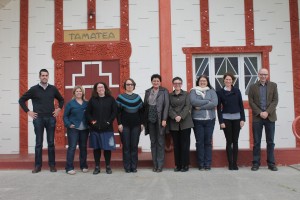
From left, Michael Stevens, Angela Wanhalla, Jane Carey, Kristyn Harman, Regina Ganter, Rachel Standfield, Shino Konishi, Tiffany Shellam, Tony Ballantyne. (Lachy Paterson photographer).
On Thursday and Friday (20-21 Nov) scholars assembled at Ōtākou marae, on the Otago Peninsula near Dunedin, for a pre-read symposium, “Rethinking Native Spaces: Indigenous Mobilities Across and Beyond the Antipodes”, co-organized by the Centre for Research on Colonial Culture of University of Otago and the Monash Indigenous Centre of Monash University. Attending were Tony Ballantyne, Michael Stevens, Angela Wanhalla and Lachy Paterson from CROCC and Rachel Standfield of MIC as well as Shino Konishi (University of Western Australia), Kristyn Harman (University of Tasmania), Tiffany Shellam (Deakin University), Regina Ganter (Griffith University) and Jane Carey (University of Wollongong). Unfortunately Lynette Russell of MIC was unable to attend. Research presented focused on a number of different aspects of Māori and Aboriginal travel in the colonial period, both within New Zealand and Australia but also further afield. A publication is planned. CROCC would like to acknowledge Rachel Standfield in particular for her hard work in bringing this event to fruition.
Visiting Fellow
This week the Centre for Research on Colonial Culture welcomes Dr. Kristyn Harman (University of Tasmania) as a visiting research fellow to the centre. Kristyn lectures in Aboriginal Studies and has published widely on Aboriginal history, race relations, warfare, and colonialism in significant international journals like Journal of Colonialism and Colonial History and the Journal of Imperial and Commonwealth History. Her first book, Aboriginal Convicts: Australian, Khoisan, and Maori Exiles (UNSW Press, 2012) was awarded the prestigious Kay Daniels prize in 2014 by the Australian Historical Association. Kristyn is visiting for two weeks, where she will be based in an office in the Department of History and Art History and during her time here will present her research at a CRoCC symposium on Indigenous mobilities in history, as well as discuss a new project on PoWs at Featherston during WWII at the Migrant Cross-Cultural Encounters conference (24-26 November).
Celebrating Marsden
It’s been a busy few days at the Hocken Collections with the events around the Marsden Online Archive launch and opening of the associated “Whakapono, Faith and Foundations” exhibition, timed to coincide with the bicentennial of the arrival of missionaries in New Zealand.
Considerable publicity had led to these events. For example:
Tony Ballantyne interview on National Radio
Television One News coverage (watch from 17.37)
Te Karere coverage (i roto i te reo Māori – in Māori)
For all the links see the Marsden Online Archive Storify page.
On Thursday afternoon Kāi Tahu and locally-based Northland Māori welcomed Hongi Hika, a self-portrait sculpture by the illustrious Ngā Puhi warrior. Bernard Makoare and Hinerangi Himiona of Ngāpuhi and Chanel Clarke, Māori Curator of the Auckland War Memorial Museum, accompanied this taonga who was installed in the Whakapono exhibition upstairs in the Hocken Gallery. Click here for the full story.
In the evening a good crowd assembled in the Hocken foyer for both the opening of the exhibition and the official launch of the online archive. The event was opened by David Ellison of the Puketeraki Rūnanka of Kāi Tahu, Bernard Makoare, and Kelvin Wright, Anglican Bishop of Dunedin. Particular praise was given to Gordon Parsonson, present in the front row of the audience, whose painstaking work transcribing the Marsden archives over many decades made the creation of the online archive possible.
The Marsden Online Archive was created by the University Library and Hocken Library, with considerable input from Professor Tony Ballantyne and the Centre for Research on Colonial Culture. This will be of great use to researchers interested in early missionary work, Māori-Pākehā interactions, and Māori culture.
The “Whakapono: Faith and Foundations” exhibition runs till 7 February, 2015.
The following two days were given over to “Dialogues”, a symposium on New Zealand’s early missionary history, held in the Hocken Seminar Room organised by the Centre and the Hocken Collections. This was kicked off with Cate Bardwell and Charlotte Brown of the University Library telling the story of how the Online Archive was created, followed with a demonstration of how to get the most out of the collection.
Three well-known religious historians, Allan Davidson (St Johns), Peter Lineham (Massey) and John Stenhouse (Otago) made up the next session. Allan talked on the “dialogue or disputation” in the first Wesleyan mission at Whangaroa; Peter discussed the Anglican moves into the Bay of Plenty/Waikato district in the 1830s, and how this lead to the sacking of the Matamata Mission Station in 1836; and John focused on Octavius Hadfield, his relationship with his Māori parishoners, and how this influenced his opposition to the Crown’s military actions.
After lunch Angela Middleton (Otago) gave an account of the powerful and influential Hariata, Hongi Hika’s daughter, informed by both historical and archaeological sources. Kuni Jenkins (Awanuiarangi) and Alison Jones followed on with a discussion their interpretation of the encounter at Hohi between Ngā Puhi and missionaries in December 1814. In the afternoon Donald Kerr gave an account of Dr Hocken’s collecting, and how he managed to amass so much of the original missionary papers, now housed in the Hocken Collections. Anna Blackman, the Archives Curator at the Hocken, then gave a talk on exploring the Marsden Collection, and earlier archival practice.
In the evening more people assembled for the launch of Angela Middleton’s new book, Pēwhairangi: Bay of Islands Missions and Māori 1814 to 1845. Manuka Henare (Auckland) formally launched the book, along with speeches by the Rachel Scott, Otago University Press publisher, Sharon Dell, the Hocken Librarian, and Paul Diamond, Curator Māori at the Alexander Turnbull Library.
Listen here to Angela’s Radio New Zealand interview, 4 November 2014.
Saturday was a shorter day. Ian Smith (Otago) gave an account of the archaeological dig and Hohi and how this informs our understanding of this first mission site and its inhabitants. Chanel Clarke and Rose Young (Auckland War Memorial Museum) discussed “Taonga Tuku Iho – Objects in Dialogue”, objects from their collection that spoke to the early interactions between missionaries and Māori.
After morning tea, Lachy Paterson (Otago) discussed Thomas Kendall’s dialogues with Marsden and the CMS on developing a working orthography for the Māori language. Paul Diamond (Turnbull) followed on, bringing to light a Māori vocabulary created by the Wesleyan missionary, Rev James Buller, in the 1830s and what this can tell us the Māori language of that time. After lunch, Tony Ballantyne (Otago) rounded off the symposium with a discussion on how applying new techniques from the field of digital humanities can give new historical perspectives, particularly when working with large collections.

